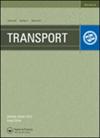AN OVERVIEW ON OPEN SCIENCE IN THE EUROPEAN RAIL SECTOR
IF 1.3
4区 工程技术
Q3 TRANSPORTATION SCIENCE & TECHNOLOGY
引用次数: 1
Abstract
Despite the increasing relevance of Open Science (OS) in the European research landscape, very few publications have addressed the analysis of its role within the European rail context. To this effect, the present paper aims at contributing to shed light on the topic by setting the cornerstone for a differentiated analysis of OS in this sector. In order to do so, the analysis is divided into 2 main sections. The 1st provides an overview of initiatives and experiences regarding OS, which have been recently carried out in the sector. The analysis of initiatives and scientific publications has shown that Open Data (OD) is the area attracting more attention and with more potential for expansion mainly due to the commercial interest of the data. As expected, the use of Open Tools (OT) is common but, interestingly, a growing interest in the development of OT in the sector has been detected. The creation of Open Standards (OSt), developed by specific rail stakeholders’ groups or by coalitions of different stakeholders is increasing in the last years. Amongst the OS areas analysed, Open Access (OA) and Citizen Science (CS) have shown less progress. However, tendencies toward an increasing interest in these areas within the sector has been also detected. The 2nd section aims to uncover the issues or barriers preventing a wider spread of OS specifically in the rail sector and suggest regulatory avenues and actions to overcome them. The identified issues revolve around 3 topics: the lack of initiative on behalf of the European Union (EU) to a) engage other stakeholders beyond the field of research, and b) leverage untapped OS potential in sector-specific situations, which could contribute to its development; and finally, the absence of a sector-specific OS framework. The establishment of such a framework could have a significant positive impact in OD, which is the most appealing area and thus contributing to the uptake of OS as a whole in the sector. In view of such issues, the present paper suggests the establishment of: (1) a European Rail Open Science Policy Platform in order to create a forum-like space in which to align the stakeholder’s positions, and (2) a Joint Rail Data Action Plan to design an OS governance framework, with the aim to ensure the usability, quality, and reliability of data. After identifying the state of OS in the rail sector and the uncovering of several issues that are hindering its development, this paper concludes that the constant further monitoring with regards to needs, challenges and interests (or lack of such) of the different rail stakeholders is key to ensure the continuous development of OS.欧洲铁路部门开放科学概述
尽管开放科学(OS)在欧洲研究领域的相关性越来越高,但很少有出版物对其在欧洲铁路环境中的作用进行了分析。为此,本文旨在通过为该领域OS的差异化分析奠定基础,从而有助于阐明该主题。为了做到这一点,分析分为两个主要部分。第一部分概述了最近在该部门开展的有关操作系统的倡议和经验。对倡议和科学出版物的分析表明,开放数据(OD)是吸引更多关注的领域,主要是由于数据的商业利益,具有更大的扩展潜力。正如预期的那样,开放工具(OT)的使用很普遍,但有趣的是,人们对该领域OT开发的兴趣日益浓厚。由特定的铁路利益相关者团体或不同利益相关者联盟开发的开放标准(OSt)的创建在过去几年中不断增加。在分析的操作系统领域中,开放获取(OA)和公民科学(CS)的进步较小。但是,也发现了该部门对这些领域的兴趣日益增加的趋势。第二部分旨在揭示阻碍操作系统更广泛传播的问题或障碍,特别是在铁路部门,并提出克服这些问题的监管途径和行动。确定的问题围绕三个主题:缺乏代表欧盟(EU)的主动性,a)与研究领域以外的其他利益相关者进行接触,b)在特定行业的情况下利用未开发的操作系统潜力,这可能有助于其发展;最后,缺乏特定行业的操作系统框架。这样一个框架的建立可以对发展中国家产生重大的积极影响,这是最吸引人的领域,从而有助于整个部门吸收发展中国家的业务。鉴于这些问题,本文建议建立:(1)欧洲铁路开放科学政策平台,以创建一个类似论坛的空间,以协调利益相关者的立场;(2)联合铁路数据行动计划,以设计操作系统治理框架,旨在确保数据的可用性、质量和可靠性。在确定了铁路部门操作系统的现状并发现了阻碍其发展的几个问题之后,本文得出结论,对不同铁路利益相关者的需求、挑战和利益(或缺乏利益)进行持续的进一步监测是确保操作系统持续发展的关键。
本文章由计算机程序翻译,如有差异,请以英文原文为准。
求助全文
约1分钟内获得全文
求助全文
来源期刊

Transport
Engineering-Mechanical Engineering
CiteScore
3.40
自引率
5.90%
发文量
19
审稿时长
4 months
期刊介绍:
At present, transport is one of the key branches playing a crucial role in the development of economy. Reliable and properly organized transport services are required for a professional performance of industry, construction and agriculture. The public mood and efficiency of work also largely depend on the valuable functions of a carefully chosen transport system. A steady increase in transportation is accompanied by growing demands for a higher quality of transport services and optimum efficiency of transport performance. Currently, joint efforts taken by the transport experts and governing institutions of the country are required to develop and enhance the performance of the national transport system conducting theoretical and empirical research.
TRANSPORT is an international peer-reviewed journal covering main aspects of transport and providing a source of information for the engineer and the applied scientist.
The journal TRANSPORT publishes articles in the fields of:
transport policy;
fundamentals of the transport system;
technology for carrying passengers and freight using road, railway, inland waterways, sea and air transport;
technology for multimodal transportation and logistics;
loading technology;
roads, railways;
airports, ports, transport terminals;
traffic safety and environment protection;
design, manufacture and exploitation of motor vehicles;
pipeline transport;
transport energetics;
fuels, lubricants and maintenance materials;
teamwork of customs and transport;
transport information technologies;
transport economics and management;
transport standards;
transport educology and history, etc.
 求助内容:
求助内容: 应助结果提醒方式:
应助结果提醒方式:


